About 80 local business leaders and bike lovers packed the second annual Portland Employers Bike Summit Friday to swap advice and anecdotes exactly like Sam Blackman’s.
The award–winning young tech CEO spoke at one of the afternoon’s panels to show how his company, the fast-growing digital video startup Elemental Technologies, saves money and attracts top-notch employees by putting low-car commuting at the heart of its workplace culture.
Even before Blackman and his two co-founders started paying themselves, they were renting a workspace with bike parking and showers and buying a TriMet pass for every Elemental employee.

Elemental Technologies
(Photo: Elemental
Technologies)
As Elemental has scored big contracts to provide streaming video services to companies like HBO Go, Major League Baseball, and ABC News, it’s needed to grow fast – from 18 local employees in 2008 to 90 this year. And of those 90, only 15 percent drive to work alone in their own car.
Another 49 percent ride transit to Elemental’s Broadway office, 15 percent bike, 11 percent walk, 8 percent carpool and two people (2 percent) use carshare vehicles.
In another world, Elemental could now be spending $235,000 a year on employee parking. Instead, its generous commute benefits cost a quarter of that:
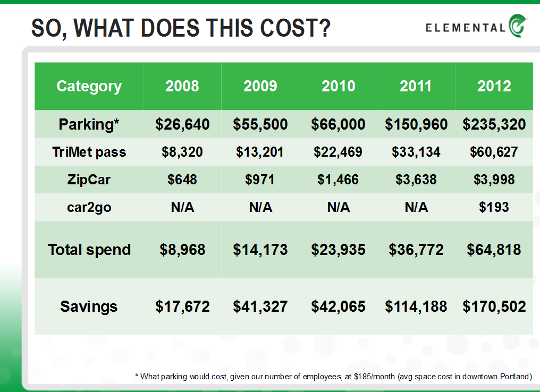
“This year we’re going to double the employee count again,” Blackman said. “So all of a sudden we’d be looking at half a million dollars spent on parking if we were a conventional business.”
Elemental, which remains venture-backed and cost-cautious, has also used bike repair and maintenance seminars, internal prizes for participants in the Bike Commute Challenge and (starting next year) “Elemental Rental,” an internal bike share service that employees will be able to use for commutes and midday errands.
To be fair, Blackman’s numbers here don’t include the rental premium Elemental is paying for its downtown location, bike storage and showers. But the numbers also don’t include what Blackman described as the most important value proposition for Elemental: recruiting and retaining a happy, healthy workforce.
Blackman said bike benefits are becoming essential to local tech companies as they scramble for talent.
“For our business, which is all about trying to recruit world-class engineers so we can compete effectively on a global stage, it’s a hugely powerful recruiting and retention tool,” Blackman said. “We have to move people from all over the country to Elemental because it’s hard to find engineers here in Portland, and the fact that we can show them this bike culture is very very valuable in their willingness to uproot their family and come to Portland.”
Tech startups in particular, Blackman added, “are having to build out very nice bike facilities to try and attract the kind of employees that they need to try and build their businesses fast.”
Friday’s bike summit, hosted and led by Regence Blue Cross-Blue Shield of Oregon, was also co-organized by the Lloyd Transportation Management Association, the Portland Bureau of Transportation, the Bicycle Transportation Alliance and my own organization, Portland Afoot.
Regence spokeswoman Samantha Reese said Monday that the company, which sells health insurance plans to employers around the Portland region, wanted to host the event because of its commitment to environmental sustainability and “plain old healthy lifestyles.”
“We saw it as an important and necessary opportunity to share information about best practices with other employers,” Reese said. “When we’re all participating in that, then it’s a healthier community at large.”
— Portland Afoot editor Michael Andersen will be contributing regularly to BikePortland for the next few weeks as we start working out more details of the collaboration announced earlier this month.



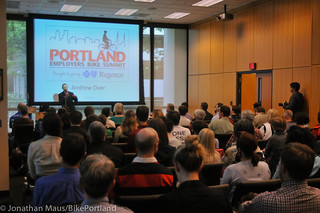
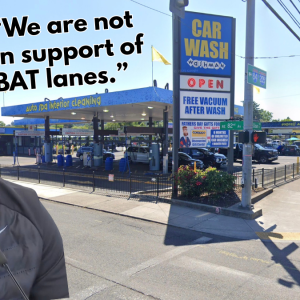
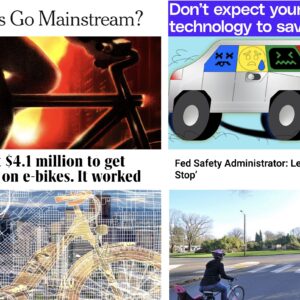
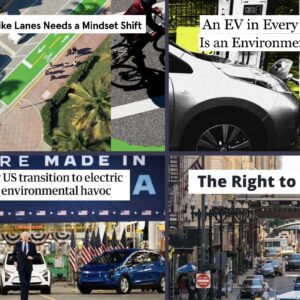
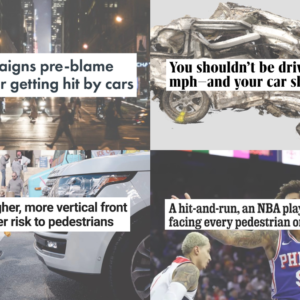
Thanks for reading.
BikePortland has served this community with independent community journalism since 2005. We rely on subscriptions from readers like you to survive. Your financial support is vital in keeping this valuable resource alive and well.
Please subscribe today to strengthen and expand our work.
Thank you to Regence Blue Cross Blue Shield for organizing such a great event.
All of this savings comes with employees actually spending less as well. A huge win+win
While I’m all for biking, transit, etc., I just hate this type of misleading cost comparison.
First, the parking space number is inflated by at least the 11% who walk and probably would have walked anyway.
Secondly, the cost for transit/bike etc is lower than reality since it doesn’t include any cost for renting space for bike parking and showers, just to start the list. I know there are others, but these are specifically called out in the article and should be included at a minimum.
Taking it one step further, we must consider that those 15%+8%+2%=25% who drive/carpool/rideshare and must require some parking which is completely left out of the final savings number.
I don’t believe neglecting these obvious shortcomings would tip things in favor of driving. It does, however, ruin the credibility of the article and makes me wonder what other facts have been inflated or neglected.
Regardless of the slant of this article, three cheers to Elemental Technologies for what sounds like an enviable and environmentally positive program.
James, you make some fair points — Elemental’s figures don’t include the rent premiums it’s paying for bike facilities and a prime location downtown on Broadway. I’ve updated the post to reflect this; thanks very much for the smart feedback.
Great piece. One thing I’d like employers to share with each other, especially the smaller ones, is how they handle the administration of transit pass programs. I have been with and talked to a lot of companies who don’t want the administrative “burden” of managing it (I know, I know) and I think perhaps sharing how they run their transit programs (beyond flexible spending accounts, and actually providing free bus passes) would help smaller businesses see how to efficiently make this important benefit happen.
Elemental Technologies, Inc. participates in the TriMet Universal Annual Pass Program. By participating in this program, we are able to offer all employees mass transit passes and the administration of the passes is made easy. We complete a TriMet survey in June of each year, which helps TriMet determine our per pass price for the renewal year, which is August for Elemental. Once the price is confirmed, we sign the contract and are issued an invoice for the number of existing employees we have. TriMet then sends us our annual renewal stickers for distribution. We distribute the annual stickers at the end of August by requesting employees to make a visit to our receptionists for their new sticker. It is a very exciting day! When we have a new employee start, we take their photo and then send it via email to our contact at TriMet. We then receive a TriMet pass and sticker in the mail for the new employee within 2-3 days. For those 2-3 days that the new employee does not have a pass, we have a few all zones TriMet passes to distribute to the employee. TriMet then issues an invoice via email to our accounting department for the new pass. If we have an employee move on, we just send their pass into TriMet and they issue us a new annual sticker to apply to a future employee that we are on boarding, so no money lost.
TriMet is responsive and all communication is done effectively over email. For a company that is growing fast, the TriMet pass administration is one of the easiest perks to administer to 100+ employees.
We’re really pleased with how the summit turned out. It was a great partnership among all the planners. I also really appreciate Regence’s strong support for our bike commuting efforts. We’re looking forward to doing it again next year.
Jackie Yerby
Sustainability Program Manager
Regence BlueCross BlueShield of Oregon.
That’s really great data. Parking cost avoidance seems particularly compelling for new or small-and-growing business.
I’m curious about other impacts besides the cost of a parking benefit.
For example, where I work, things are a bit more complex:
– 1400 employees on site
– employees park mostly in a high-capacity multi-level garage on site
– employees pay for parking, about $80/month
– TriMet universal passes are given to all employees
– only about 3% of employees arrive by bike (if bike racks and lockers are a useful indicator)
I’m curious whether my employer could statistically expect to see benefits to the bottom line, in terms of health care costs, employee productivity, talent recruiting and retention, health-related absences, etc… if our work site had more incentives for bike commuting, such as secured/covered/high-capacity bike parking, increased shower/locker amenities, on-site mehcanical tools/workstation, etc.
Aimee, that’s a great idea for a topic for next year’s summit. Thanks for suggesting it. – Jackie